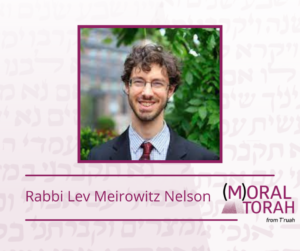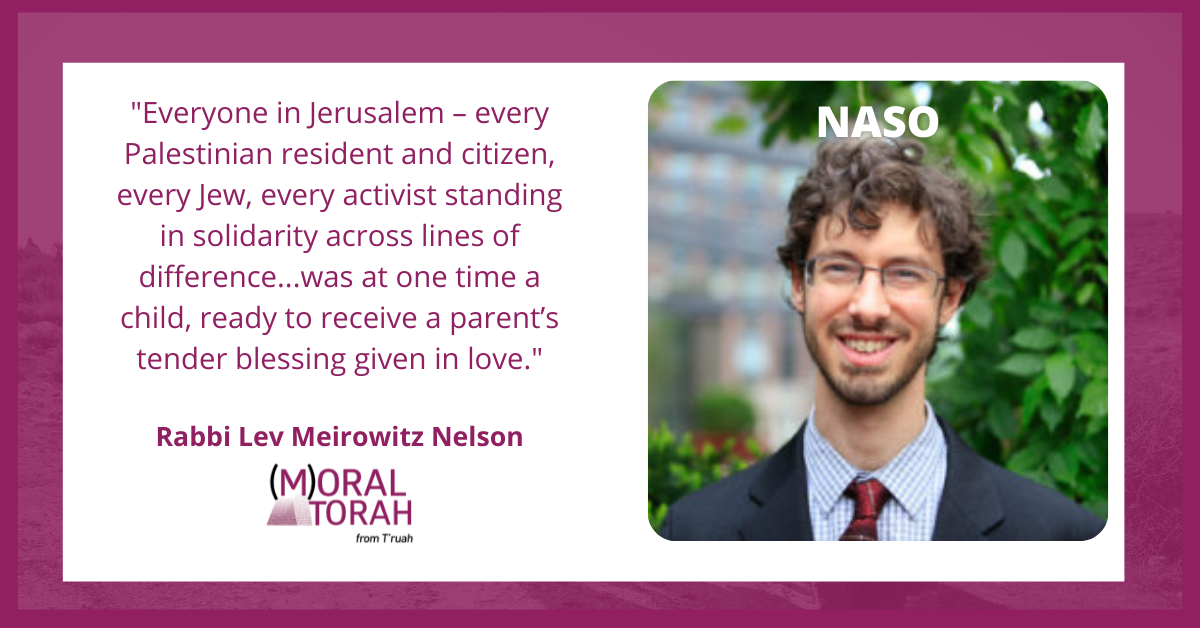A D’var Torah for Parshat Naso by Rabbi Lev Meirowitz Nelson
For as long as I can remember – not just as a child, but even as an adult – whenever I am with my parents for Shabbat, my father has given me the same blessing. Standing behind my chair, he places his hands on my shoulders, whispers in my ear the ancient priestly blessing found in this week’s parshah, and kisses the top of my head. A moment of sanctity, of quiet closeness.
May the ETERNAL protect you and keep you.
May the ETERNAL’s face shine for you and show you grace.
May the ETERNAL lift up [God’s] face towards you and grant you peace. (Numbers 6:24-26)
Many Jews know these three short verses from this week’s parshah well. What’s less familiar, perhaps because it reads more like stage directions than script, is the verse that immediately follows:
They [the priests] shall put My [God’s] name on the people of Israel, and I shall bless them. (Numbers 6:27)
Seen from one angle, this explains the power of the blessing. It’s not that the words contain some magic potency; rather, they act as a conduit, perhaps a homing beacon, highlighting for God where the divine blessing should come to rest.
And on the other hand, this verse just deepens the mystery. What does it mean to put God’s name on a person or a people? We know how God changed Abram and Jacob’s names to incorporate elements of the divine name, but when we bless our children or our congregations we don’t change their names. The priestly blessing mentions God’s face twice – remarkable, given that the whole text is just 15 words – but does not draw attention to God’s name.
Sign up to receive (M)oral Torah in your inbox each week.
Rashi, quoting the ancient midrash Sifrei, opines that the priests were to pronounce God’s ineffable four-letter name, which in nearly all other instances we replace with “Adonai” or even “Hashem,” The Name. All well and good as a historical explanation, but the secret of that name was lost millennia ago, so it doesn’t help us understand “placing” God’s name today.
Perhaps Deuteronomy can help us make sense of it. Throughout the book, we hear repeated references to “the place that God will choose to cause [God’s] name to dwell” – Jerusalem. The Hebrew word choice is different, leshaken rather than lasim, but the imagery feels the same to me. X marks the spot.
How did Jerusalem come to be that place that God had chosen? In II Samuel, we read a historical-political account: how David conquered the city and moved his capital there to unify his powerful southern tribe of Judah with the northern tribes. But the rabbis, wanting Jerusalem to be more than just an ancient Washington, DC, imagine many grander and more meaningful rationales.
One midrash, recorded in the medieval collection Yalkut Shimoni, offers this:
Why did Benjamin merit having the Presence dwell in his territory? Because all the tribes were in on the sale of Joseph, while Benjamin had nothing to do with it. So the Holy One said: Am I to tell these to build the house I choose to dwell in, so that they may pray to Me in it and I may be filled with compassion for them? No. They were not compassionate to their brother, so I shall not have My compassionate Presence dwell in their territory. (VeZot HaBrachah 949)
In this take, the divine name seeks a place of compassion for its dwelling-place; a place devoid of compassion is not fit for it.
This aligns with the expectation that the priests hold only love in their hearts when they bless the people – expressed in the brachah they say immediately beforehand, which concludes “…and commanded us to bless [Your] people Israel with love.” Love makes a blessing stick; in fact, if they find themselves angry at the congregation on a given day, they are prohibited from offering the blessing.
Find more commentaries on Parshat Naso.
Compassion is Jerusalem at its best, its most aspirational. But there is also a dark side to Jerusalem as the site of the Akedah, the binding of Isaac. That more closely resembles the Jerusalem we see today: one of religious zeal and fanaticism, of pain and hurt, of an inability to see what is before us – neither the ram stuck in the thicket nor the fear and humanity of the boy bound to the altar.
A third midrash, from Pirkei Avot, points a direction that I hope we can move Jerusalem towards. In a list of ten miraculous conditions that held throughout Temple times, the Mishnah recounts:
…They would stand crowded together, but when they prostrated themselves everyone had plenty of room; no snake or scorpion ever harmed anyone in Jerusalem; and no person ever said to their fellow, “There is no space for me to spend the night in Jerusalem.” (5:5)
There need not be venom and deceit in Jerusalem.  There can be enough room for everyone who calls it holy – Palestinian and Israeli; Christian, Muslim, and Jew – if we are willing to make that space, to stand up for it, to refuse nationalists and zealots the right to shape it.
There can be enough room for everyone who calls it holy – Palestinian and Israeli; Christian, Muslim, and Jew – if we are willing to make that space, to stand up for it, to refuse nationalists and zealots the right to shape it.
Because everyone in Jerusalem – every Palestinian resident and citizen, every Jew, every activist standing in solidarity across lines of difference (even, God help them, every soldier and police officer put into an impossible situation and given only blunt tools to do what should be delicate work) – was at one time a child, ready to receive a parent’s tender blessing given in love.
Rabbi Lev Meirowitz Nelson is the Director of Rabbinic Training at T’ruah and editor of the (M)oral Torah series. He also serves part-time as the rabbi of the Flatbush Jewish Center in Brooklyn.

